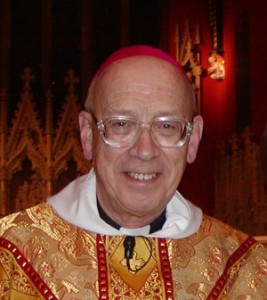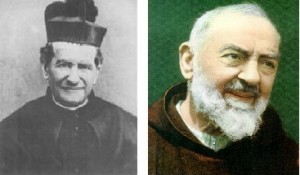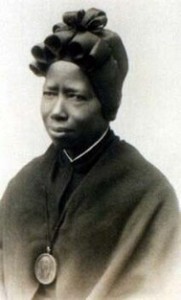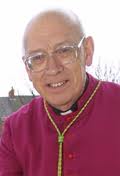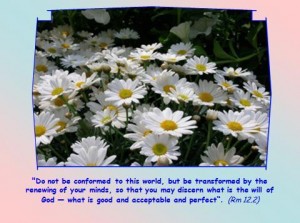 |
“Do not be conformed to this world, but be transformed by the renewing of your minds, so that you may discern what is the will of God – what is good and acceptable and perfect” (Romans 12: 2)
Over this past month, this extract from St. Paul to the Romans has grown in its meaning for me. It is taken from this month’s ‘Word of Life’, an extract taken by people, all over the world, on which to focus for the entire month; the idea, then, is to try to focus on it, especially in ‘one’s life’; the idea, also, given the chance by God’s grace, is then to share what the ‘Word of Life’ might be doing in ‘your life’ with others who might meet in a small group for this very purpose.
The idea began with Chiara Lubich, and her companions, when they wanted to give their lives to God. It was 1943 and in the midst of such serious bombing of their home town (Trent, North East Italy – famous for the Council of Trent in the mid-16th Century), that they feared they would not live to see another day. So, they asked themselves, where, or what was it, that lasts in life – that does not just disappear, and their answer? They concluded, what they already knew, that the only reality that does not pass away, is God himself. The ‘Word of God’ brings ‘life’, as it has done, for me, this June. The Word of God, lived and experienced – not just studied, academically – brings us into relationship with God, who is always there for us; also, it can bring us to a state of ‘in communion’ with others, whoever they might be.
Apart from concentrating, and letting, these Gospel words sink in to my heart and mind, on three occasions, I have been able to share the true meaning of them with others, and, in that sharing, those words, truly, became ‘life-giving’. The first occasion arose with a group of men in Religious Life, like myself, the second, in a prison, sharing with some of the unfortunate prisoners; the third was with a small group of parishioners. What struck home was the way in which St. Paul clearly contrasts the two concepts: ‘conforming’ to this world – something to be avoided – and ‘transformation’, so that one’s mind can ‘discern’ what is good, acceptable and perfect.
My experience of life teaches me that it is too easy, even as a priest and a monk, to conform to this world, in its attitudes, and its spirit. It is all too easy to become enclosed in a little ‘bubble’ of self-concern, without being ‘open’ to the needs of each day, and each day’s varying challenges. Even sitting alone, in front of the computer, can cut a person off from what God might really want of me. Driving in my car, alone, selfishly wanting to get the best parking place, or being determined not to ‘let the other driver in’ – that ‘so-and-so’ who is trying to turn in to my lane – is so easy. Wanting my own way of doing things, and not being ‘in communion’, with what others around me, might want, at all; on top of such self-centred actions, are the limitations of forgetfulness, sometimes necessary hard work, which may be so absorbing that God, himself, is neglected – and never mind others! These negative realisations are the results of life experience; it is not theory, or books, that bring one to the knowledge that there is but ‘ONE REALITY’ that does not change; life, itself, is the teacher – and what we all experience – shows us that the ‘One Reality’ is God our Father; we can then respond to the gift of God’s presence in our lives; we can then allow Him to come into our lives and enlighten us.
I rejoice that, very recently, we have, at last, been able to restore the Angelus Bell, at our Church. At 12 noon, and at 6.00 pm, the Bell faithfully rings out, and I have found myself going back to the practice we had at school – stopping everything – to focus on what really matters.
Concentrating on what really matters takes me, at the same time, to the fact that we, in our Parish, are still mourning the death of Bishop Ambrose, and, for those interested, it may be enlightening to enter the website www.frambrose.org.uk set up, and linked to our Parish website, to read the truly positive impact, this good man made, on so many different people. From that site, I very much like the tribute below, written by a Colombian priest and friend; Father Luis Fernando Carvajal got to know Father Ambrose and myself last year, as a visitor to the Parish: his writing echoes the thread of my reflections in this blog:
“I was thinking that from heaven Ambrose will continue to help you; because if this is what he did while he was on earth, we cannot begin to imagine the things he will now do next to God; I find myself imagining the graces you will begin to receive from heaven thanks to his intercession. Graces that you will receive as parish priest, and graces that all parishioners will receive, because he knew how to look after them all as a Bishop of course, but above all because of his great humility. I am not saying this because I have read it in some book, or from some theory in my head; it comes from my experience that I also had when my dear mother died, and also since my sister recently died. In the short time that I knew him, he gave me such a good impression, for his humility, and for the “little tasks” I saw him doing for others. Now is the time not to pray for him; rather we should pray with him as he is surely before God at the heavenly liturgy.”
(In forwarding this blog by e-mail, the programme distorts the original formatting of the document. Readers are, therefore, advised to visit the website www.stmarysblog.co.uk should they wish to read it in its original format).
